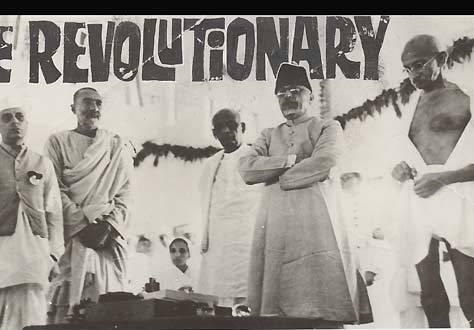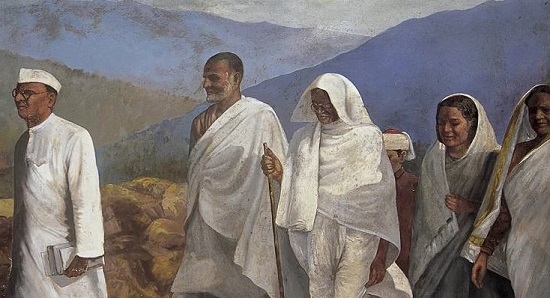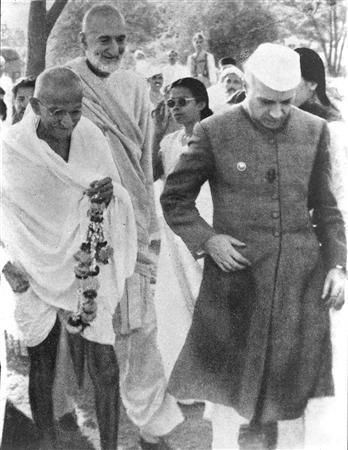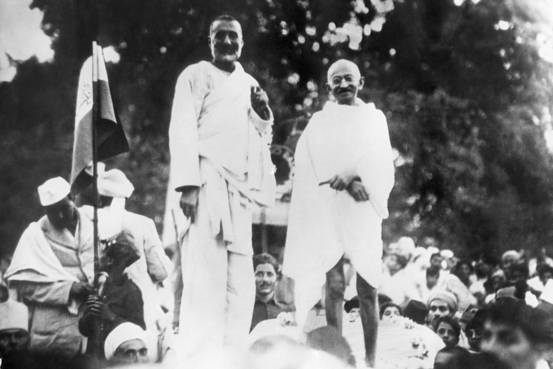Remembering a freedom fighter & symbol of unity......by Mukhtar Khan
It is a matter of those days, only a few years had passed since Mahatma Gandhi had returned from South Africa. Soon the discussion of non-violent Satyagraha being run by him started happening all around. This word also reached the Pashtun Pathan tribe on the border of Afghanistan, hundreds of miles away. An educated young man from the same clan liked Gandhi's philosophy based on truth, non-violence so much that he has now made public service the goal of his life.
Seeing the sacrifice and sacrifice of this Pathan, people went ahead and gave him the title of 'Border Gandhi'. The full name of this young man was 'Khan Abdul Ghaffar Khan'. People also fondly called him as Bacha Khan or Badshah Khan.Khan Abdul Ghaffar was born on 6 February 1890 in the Frontier Province (present day Pakistan). Father 'Behram Khan' was a person of efficacy and prestige.

He was sent to study in a missionary school. After this he came to Aligarh for higher education. Badshah Khan, who had a tall stature, actually wanted to become an officer in the army. Once saw an Indian officer being insulted by an English officer. Losing his self-respect, why would it be wasteful to give him a job in the British Army? At the same time, he renounced the idea of British army job from his heart forever.
Badshah Khan was born in the Pashtun Pathan tribe of the Frontier Province. There was lack of education and modern values of life. People were divided among themselves in the name of tribes. Weapons and violence used to go hand in hand. Maintaining family enmity, taking revenge on each other was also common. The condition of women was even more pathetic. In these difficult circumstances, Badshah Khan decided to bring public awareness among these Pathans. Now his age was only 20 years. First of all, he opened a school in 1910 for the education of girls.

After this, an organization named 'Afghan Reform Society' was formed. Slowly the local people started joining them. He felt very sad to see the plight of his people. He knew that once he was successful in winning the hearts of these Pathans, then no one could stop him from making a change.
He used to go from village to village in a group and gather people. In his speeches, he often emphasized that "we should spend the rest of our life, time and money for the betterment of our nation. Try to remove social evils. This is the only difference between human and Evil, who lives only for himself. One's effort to improve its' own life is animal instincts". With his effective speeches, he used to inspire people to live for the sake of others.
In 1929, he formed an organization named Khudai Khidmatgar. Khudai Khidmatgar means one who serves God, but why does God need anyone's service? To serve the servants of God is to serve God. The two important goals of this organization were service work and freedom from the slavery of the British government.

The conditions for joining the Khudai Khidmatgars were to follow the path of non-violence throughout life and stay away from violence, to work for two hours a day whether rich or poor, to follow simplicity and truthfulness in life, not to have any discrimination among themselves and Wearing red kurti as an identity.
Badshah Khan used to go from village to village and make the Pathans realize the slavery of the British. At the same time, he used to introduce them to education and modern life values. Hard from outside but very soft from inside, the charismatic effect of Badshah Khan's words started appearing on the hearts of the Pathans.

Till yesterday, the Pathans used to wave their weapons in the air on this matter. Today, the same people would have remained steadfast on the front peacefully despite the oppression and oppression of the British. Within a few years, hundreds of Khudai Khidmatgars started gathering against the British rule. In Khyber Pakhtunkhwa, such an army of Khudai Khidmatgars got ready.
Such an army which would be ready to lay down its life by following the path of truth and non-violence. Seeing the spirit of these Satyagrahi activists, the British used to say, "Pathans who are inclined to violence can be stopped but it is more difficult to deal with these satyagrahis."
To crush Badshah Khan's movement, the British government chose the path of repression. Now again and again he would be arrested and sent to jail. In the cold winter nights, he used to sleep on the floor. In whichever jail Badshah Khan used to go as a prisoner, it would have been difficult to get clothes of his size. They often served long sentences in the same tight clothes.
In the freedom movement, Badshah Khan was such a freedom fighter who spent the most of valuable years and part of his life in prison. Governments used to get scared just because of the presence of Badshah Khan in processions or marches. The British government would constantly keep an eye on his movement. That's why the British government kept him in jail for the whole 15 years.
He did not get relief even after independence. After partition, the Pakistan government did not like the independence of this Gandhian leader. The governments here also made him suffer severe torture in jails for 15 years, his companions were also tortured a lot. Despite this, Badshah Khan and his companions never adopted the path of violence. After a few years, Badshah Khan's organization Khudai Khidmatgar and Congress merged.
Here too, due to their sense of service and non-violence, the Khudai Khidmatgars had created a separate identity for themselves. Even after joining Congress, he remained like a soldier. In the Wardha session of 1934, Khan Abdul Ghaffar Khan was also offered the presidency of the Congress. But Badshah Khan politely declined the offer saying "I am a soldier and want to remain a soldier".
Once while talking to Gandhi ji, the topic of non-violence started being discussed. Badshah Khan asked Gandhiji "It is only a few years since we Pathans learned the lesson of non-violence. While you have been teaching the people here to adopt non-violence for many years. Despite this, during the 'Quit India Movement' in the area Violent incidents took place at many places. On the other hand, in comparison, the Pathans of the border continued to bear the oppression of the British, but they did not take up arms in any case, even though they too had easily available weapons."
Hearing the question, Gandhi smiled in his heart and said, "Badshah Khan……! To follow the path of non-violence is the work of the brave, not of the cowardly, Pathans are a braver community than others, this is the proof of this."
Like Mahatma Gandhi, Badshah Khan did not want the country to be divided in the name of religion. He kept trying till the end that India remained united and one. But finally, the Congress and the Muslim League accepted the proposal of partition. As much as Gandhi was hurt by the partition of the country in the name of religion, border Gandhi was equally distraught and sad. With a faint heart, he would often say, "Nobody thought about us Pathans while taking the decision to partition India. We were left to God's mercy."
If Badshah Khan wanted, he could have lived proudly in India after partition, but he was concerned about his Pathan brothers. Even after the formation of Pakistan, Khan Abdul Ghaffar Khan continued his struggle.
He continued to fight with the governments there for the rights of Pashtun Pathans. Even the Government of Pakistan termed him as an agent of India. He was tortured in jail for years. After being in prison for 30 years, his health was now beginning to deteriorated.
Badshah Khan got a long life. As long as he remained active, he kept working for the country and the society. In 1987, the Government of India honored him with the highest civilian award- Bharat Ratna Award. A year after this, on January 20, 1988, at the age of 98, Badshah Khan left this world after living a struggle.
To be aware of a great personality like Sarhadi Gandhi means to remember the shared culture and history. The life of Sarhadi Gandhi, who died for Hindu-Muslim unity and integrity of the country, instills a belief in us. We can proudly say that Badshah Khan was like a shining star of Ganga-Jamuni Tehzeeb. Badshah Khan's human friendship and love will be remembered on both sides of the border.
February 11, 2023
-

-
Mukhtar Khan, The writer is a member of Janwadi Lekhak Sangh, Maharashtra
jlsmaharashtra@gmail.com
Phone No. : 9867210054
Disclaimer : The opinions expressed within this article are the personal opinions of the writer/author. The facts and opinions appearing in the article do not reflect the views of Babushahi.com or Tirchhi Nazar Media. Babushahi.com or Tirchhi Nazar Media does not assume any responsibility or liability for the same.